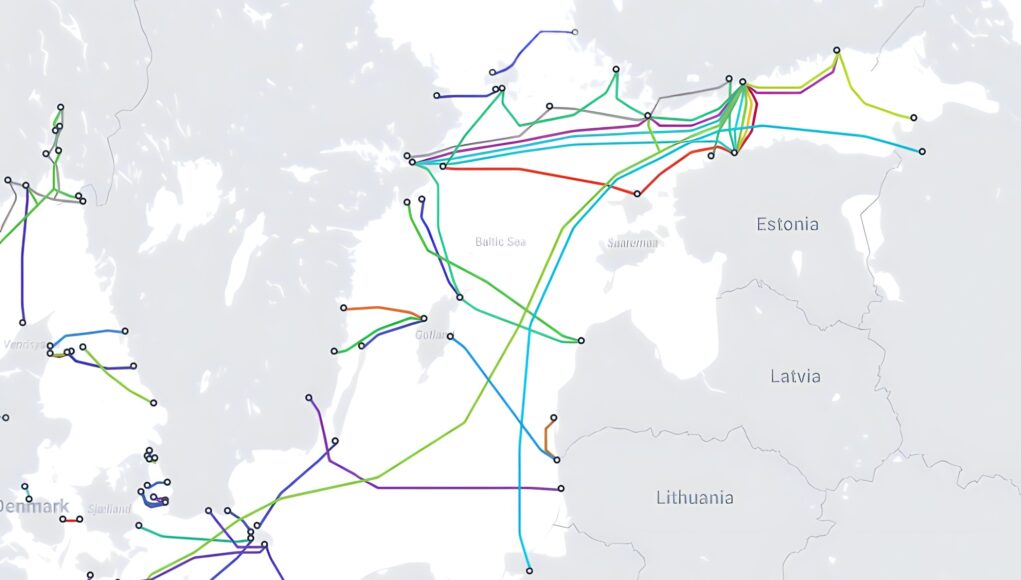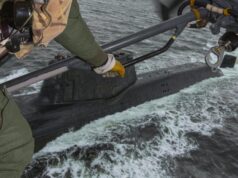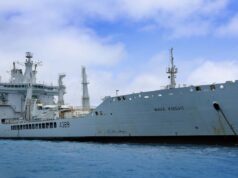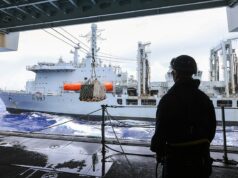Latvia is investigating “significant” damage to an undersea fibre optic cable linking the country with the Swedish island of Gotland, following what officials believe was external interference.
The incident, reported early on Sunday, is the latest in a series of disruptions to critical infrastructure in the Baltic Sea.
The Latvian State Radio and Television Center (LVRTC) detected disruptions in the Ventspils-Gotland section of the cable via its monitoring system. The LVRTC stated that the damage likely resulted from an external force, though the full extent and nature of the damage will only be clear after repairs begin. The cable lies at a depth of more than 50 metres.
Latvia’s Prime Minister, Evika Silina, confirmed the situation during an emergency press briefing, stating: “Early morning today we received information that the data cable from Latvia to Sweden was damaged in the Baltic Sea, in the section that is located in the Exclusive Economic Zone of Sweden. We are working together with our Swedish allies and NATO on investigating the incident, including patrolling the area, as well as inspecting the vessels that were in the area. Authorities have intensified information exchange and started a criminal investigation.”
NATO ‘rapidly responds’ to protect Baltic sea infrastructure
The Latvian navy has deployed a patrol boat to investigate a vessel suspected of involvement in the incident, with two additional vessels in the area also under scrutiny. The country is working closely with NATO allies and Baltic Sea nations to determine the circumstances of the damage. Silina described the incident as “significant,” noting that external damage is likely.
“The National Armed Forces monitor the situation involving a submarine optical fibre cable in the Baltic Sea. Today, on January 26, the Naval Forces of the National Armed Forces received information from the Latvian State Radio and Television Centre regarding damage to the Ventspils-Gotland optical cable identified in Sweden’s exclusive economic zone. The Naval Forces immediately dispatched a patrol vessel to inspect a potentially involved ship.
The Naval Forces have communicated with NATO allies, including Sweden, and maintain ongoing information exchange. The Naval Operations Center has analyzed vessel movements in the area of the cable damage. Two additional vessels were identified in the approximate underwater infrastructure damage area, located outside Latvia’s territorial waters and exclusive economic zone. The circumstances of the incident are still under investigation.”
This development follows NATO’s recent announcement of ‘Baltic Sentry,’a deployment of frigates, patrol aircraft, and naval drones to safeguard critical infrastructure in the region.
NATO has reserved the right to act against vessels posing security threats, emphasising the growing importance of protecting undersea infrastructure after numerous incidents involving power cables, telecom links, and gas pipelines since Russia’s 2022 invasion of Ukraine.














They dispatched a patrol boat to inspect a ship and also two other vessels were also subject to investigation.
Malta-flagged bulk carrier Vezhen under investigation
Its a fibre optic line so i believe they are easlier to fix and restore
If this ship was the cause & it was on purpose, what can Malta (an EU member) do as the flagged country?
Hope they can find who’s actually giving instructions to do all this and expose them. If this ever happens closer to the UK i hope the response is substantial.
Fine/ imprison the captain of the ship. He is in charge. It’s his fault if the anchor was “accidently dropped ” mid-ocean for no apparent reason. No excuses, isn’t there a light on the bridge that illuminates if the anchor is dropped ( like a parking brake light) ???
It cannot be an accident something like this happens…anchor drill mid-sea? Painting the anchor and it fell out me ‘ands, guv ?
The Vezhen has been seized by Sweden and it has a broken anchor.
The Russians only seem to understand force, like most bullies and thugs. Whilst immediate and forceful action is reckless, it perhaps time we start to slowly boil the frog…
Doing what exactly?
Well you get a pan of cold water, pop a frog in it then pop it on a low heat on the hob…Im not sure how that impacts on Russia, but I suppose you could post the dead frog to Putin……RSPCA may have some come around and chat to you though so it’s probably not worth it.
It was a metaphorical frog. Obviously blitzkrieg on Moscow isn’t a sensible (or viable) option, but sailing a second had oil rig supply ship a little closer than usual to a Russian ship seems to be the most we have offered in response to Russian provocations. Perhaps it’s time to retaliate in kind and start to defend ourselves from the grey-zone warfare that the Russians are waging on us by reciprocating? Nerve agent attacks and radioactive attacks on UK soil, murders in the streets and public parks of Berlin, constant cyber attacks, bombs in Czech depots, multiple sub-sea cable sabotages, shooting down passenger aircraft, firing missiles/attacking at our recon planes in international airspace and, it would seem, parcel bombs on European jets… Enough, surely?
Completely agree..it’s time to send Putin some boiled frogs in the post.
I wonder if there is a RSPCMA Royal Society for Prevention of Cruelty to Metaphorical Animals?
Send a whole fleet of royal navel warships and take kaliningrad 🤣🤣🤣🤣
Woooops I said fleet lol.
The nations of the Baltic states probably need to tighten up their domestic laws on damage to cables. The international law in regards to cables in the open ocean is profoundly weak..essentially the nation of the flagged ship can require the owners of the ship pay for the damage or if it was a criminal act prosecute for criminal damage under their own law..if it happens in national waters that nation it happened in can prosecute..
Essentially what is needed is for the European nations to all agree a very draconian set of penalties if a ship is found to have purposefully or negligently damaged a cable…including a long prison sentence for the ship’s captain and deck officers and loss of the ship. Russia will then struggle to find any ships willing to drag an anchor across a cable without a very very good reason.
Alternatively, just sink them, Jonathan.
May as well put in local legislation to legally seize them and strip them of any assets worth having.
Break my cable I steal your ship and all the stuff on it ..seems balanced to me.
It is about time we stopped using the the term “Internatational law” they are at best nothing more than conventions on which civilised contries try to observe. They are broken all the time by many as there is really no come back but words which are often ignored.
Any cable or pipeline cited at less than 70 metres is going to be vulnerable to Jonnies like me. We were trained to get down to those depths and fiddle around. You could do it from some vessels without entering the water from any external part of the ship, meaning outside observers couldn’t lay blame on our ship. That said, a simple anchor drag could cause just as much, but not targeting damage. To find these cables in the Baltics is easy, they don’t bury them due to cost. They are no thicker than a typical garden hose pipe and in cases of an anchor drag, you can see the furrow the anchor made as it approves the cable. From that, you can if you stop the ship that damaged it, confirm its involvement.
I would have thought that any new cables and pipeline shallower than 50 metres would start to be buried in places such as the Baltics, Mediterranean and East Coast of the US.